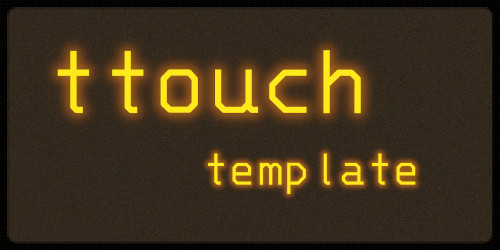ttt-jsclass
v1.0.1
Published
Simple javascript class template
Downloads
6
Maintainers
Readme
🔎 looking for the ttouch repository -> ttouch

ttouch template template
Seed project for a new ttouch template
In order to create new templates to use with the ttouch tool it is easier to start from a preexisting scafold and not having to create the complete project from scratch.
This is this scafold
Create new template
$ npx degit dejanfajfar/tttemplate ttt-newThis will put the required scaffolding into the ttt-new folder
Install the dependencies
$ npm install‼️ important -> Update the package.json‼ ️
degit is a good tool but it still lacks the capability to manipulate the cloned files once on the target system. This is why some data has to updated before you start. The data that will have to be updated is:
- name
- description
- repository url
- author
- bugtracker url
- homepage
If this is not done then the publishing to npmjs.org will fail
Naming your template
The name directory where your template lives has really no merit on the published name of the template package. In order for your template to work with ttouch please name it using the following template:
@ttouch/{template-name}
The template render function
Before you start work on your own generator I have to bring this one important point across. Regardless of what you do in essence
The only thing that the template has to do is to return a string!
So all you really have to implement is:
module.exports = () => {
return "";
}This will create an empty file. Nice bot we can do better...
For more complex behavior you can use the provided options object.
module.exports = options => {
let template = '';
...
// do something with options
...
return template;
}The options object
The option object passed to your render function contains some basic information.
This information includes:
- absolutePath -> The absolute path, containing file name and extension, to the file being created
- fileName -> The file name and extension
- template -> The template name, not extended with @ttouch/ part
Sample
Calling ttouch with
/home/me $ ttouch test.file -t shWould produce the following options object
{
absolutePath: "/home/me/test.file",
fileName: "test.file",
template: "sh"
}Structure
.
|-- src
| |-- template.template
| |-- template.js
| `-- template.spec.js
|
|-- .editorconfig
|-- .gitignore
|-- .mocharc.yml
|-- index.js
|-- LICENSE
|-- package-lock.json
|-- package.json
`-- README.mdStarting at the bottom with the infrastructure files we have:
- README.md -> The readme file that you should customize to tell your story
- package*.json -> The package file. Do not forget to fill in the blanks of the package.json file
- LICENSE -> The license of the template. Currently it is the Apache 2.0 license but you can change it if you want. But if you do do not forget the package.json to.
- .mocharc.yml -> Mocha configuration file
- .gitignore -> The gitignore file. Should cover the most common ignored files
- .editorconfig -> Contains common editor configuration settings. Change or ignore at your own leisure
- index.js -> Template entry point. Must export the template function. Under normal circumstances you will mostly not have to touch it
- src/template.template -> The handlebars file template.
- src/template.js -> Main logic file where the template gets rendered and returned to the calling application
- src/template.spec.js -> The mocha unit test for the template.
The replacement README.md
The readme is quite important so I would like to provide a stub README.md file. This file is the README.stub.md.
To replace the contained README.md without loosing it I would suggest to:
$ mv README.md README.bak.md && cp README.stub.md README.md
